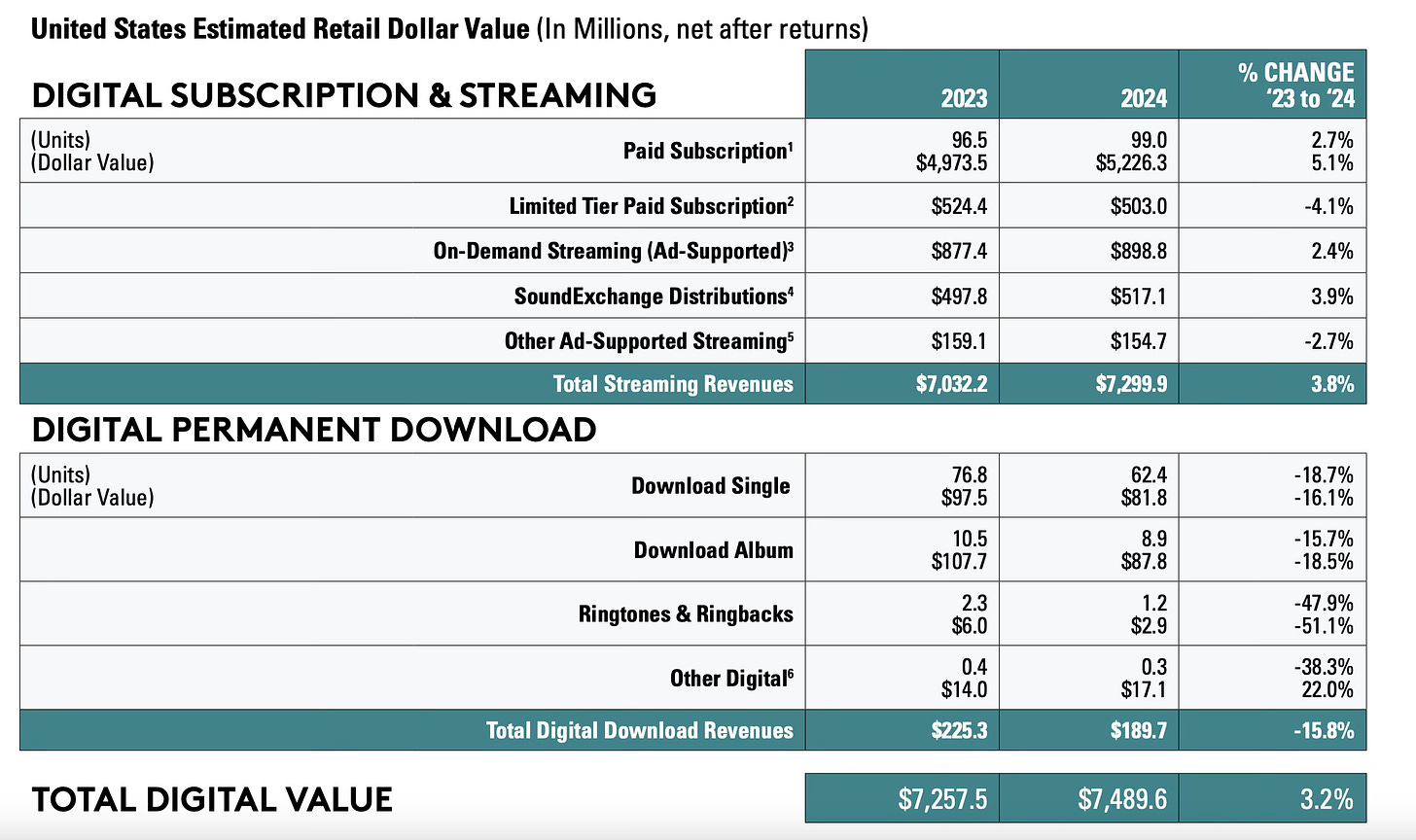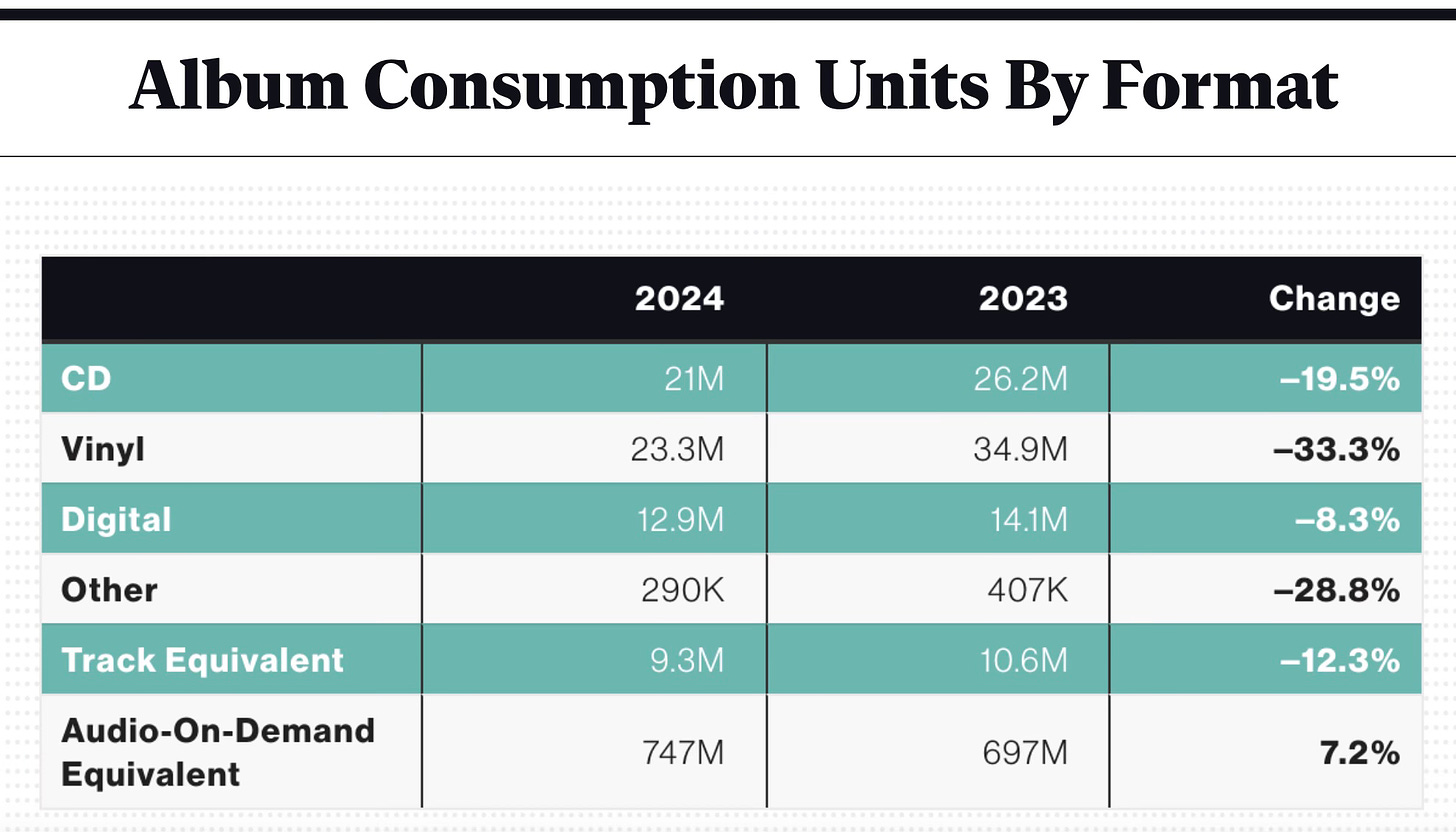Let's Get Physical
Are sales of physical records going up or down? Conflicting data, spooky coincidences, and the importance of questioning sensationalist headlines (including this one)
Hello vinyl lovers! I strongly recommend listening to the voiceover as you read along or independently. Otherwise you’ll miss out on a lot of cool stuff which you won’t find in the text post.
Just click on the Play button above for the full experience. Expect suspense, cliff-hangers, unlimited amounts of sass, a penchant for vocal dynamics, and the cheekiest remarks this side of the Atlantic.
Thanks for spreading the word!
Just as we were celebrating the positive half-year record sales figures on both sides of the pond, Billboard published its Market Watch report for the week of 3 October, which claims vinyl sales in the US are down 33% from last year.
Mainstream news outlets around the world have been sounding the death knell for vinyl, parroting the latest Billboard figures without much in the way of critical analysis.
To make things worse, some commentators have been juxtaposing these Billboard figures from October, which supposedly paint a gloomy picture for the current vinyl market in America, with the strong half-year vinyl figures from the UK, which were published in the summer.
Because, you know, apples and pears.
So how do we untangle this mess?
Join me on this transatlantic journey…

According to the Recording Industry Association of America (RIAA)’s mid-year report, revenues from physical formats reached $994m in the first six months of 2024, up 13% from the same period last year.
Revenue growth from physical formats continued to outpace all other major forms of recorded music: physical sales were up 13% whereas digital sales saw an increase of only 3%.

Vinyl sales grew in revenue and unit terms: sales reached $740m, up 17% from mid-2023, with over 24m shipments, up 11% from last year.
CD growth was a bit slower: revenues were just under $237m, a slight increase from last year, with roughly 17m units sold, up 3%.
The RIAA also noted that, for the fourth consecutive year, vinyl is outselling CDs in unit terms.
For context, while streaming and digital sales brought higher revenues, growth in the sector was lower.
This was, up until very recently, the latest official information we had available for the US market.
So what’s happening now?
Billboard has just published its Market Watch report for the week of 3 October, which shows a 33% decline in vinyl sales:
Wait, what?
33.3% to be precise. Eerily similar to the speed of a standard LP, a coincidence which didn’t escape the eyes of the most cynical fastidious among us.
The spookiness doesn’t end there, though. According to Billboard, 23.3m vinyl units were sold in the year to October. However, the RIAA reported 24.3m for the first six months of the year. One million more… over a shorter period!
Someone —one of you, my American friends— must be hoarding at least 1m records in your basement… assuming you guys didn’t buy any new vinyl through any official channel in the last few months.
Different methodologies, of course. For starters, the RIAA mentions “LP and EP” sales, whereas Billboard talks about “vinyl albums”.
More than one million records missing, though?
To add insult to injury, several commentators are seemingly so oblivious to this discrepancy that they have also been throwing some UK figures into the kitchen sink because, you know, I’m sure Americans love being told off in a British accent.
As your UK correspondent, it is my duty to set the record straight. Put the kettle on and fasten your seatbelts, folks: we’re heading to Britain!

According to half-year figures published by the Entertainment Retailers Association, the Official Charts company and the British Phonographic Industry (BPI), 8.5 million physical albums were sold in the first half of 2024, up 3% from last year. This is the first time physical record sales in the UK have registered a year-over-year increase since 2004.
Vinyl sales were up 13.5% and generated over £86m, with more than 3m units sold in the first half of 2024, up 12%.
CD sales brought in £58m, a year-over-year increase of just over 3%, with almost 5m units sold, down 1.5%.
This side of the pond, CD is still stronger than vinyl in unit terms, although the gap seems to be narrowing.
For completeness, streaming equivalent albums (SEA) increased by 11% year-over-year to almost 88m units.
While streaming revenue figures for the UK market have not yet been consolidated, the music streaming market is projected to reach revenues of £1.7bn in 2024, with an expected annual growth rate of 4%.
The UK doesn’t tend to publish interim figures between half-year and year-end results. For a full and fair comparison between the two countries, we’re going to have to wait until January.
But as you can see, these half-year numbers are fairly similar to the RIAA mid-year figures, even adjusting for the difference in size between the two markets.

Circling back to the US, while it’s clear the RIAA figures, not the Billboard numbers, provide a better comparison with the UK mid-year results, we still have more than one million records unaccounted for in the American market.
Let’s take a look at the small print of the Billboard report, shall we?
If they can’t provide an accurate year-over-year trend regarding physical sales, why did they put the 2024 and 2023 figures right next to each other? Calculating the percentage change was the cherry on top.
We all know the US economy may well have slowed down after June, so I am not necessarily disputing that the strong vinyl tide might have turned.
Besides, it’s no news that conflicting sets of data get routinely manipulated, or that different methodologies are used to measure record sales. Do multiple variants count as one? Are anniversary box sets and “legacy” reissues, which make up a significant chunk of new vinyl sales, now excluded?
It’s too early to tell.
The problem is not so much about the change in methodology. It’s the surreptitiousness of doing it in the background and expecting no one to notice.
It’s the lack of journalistic rigour in regurgitating misleading information to write headlines that fit a certain narrative.
That’s the problem, my friends, and it’s an insult to our intelligence, no matter which side of the pond —or of this fictitious battle— we are on.
Thanks for reading/listening. Happy spinning!







That 33% decrease sounds very clickbaitey to me. So many outlets looking to sensationalize things to attract eyeballs. I was interested to see that CDs were still outselling vinyl in the UK. I think that if and when I decide to get back into physical media there will be a place for both those formats on my collection.
Andres, listening to your voice over always makes me smile and usually laugh. This one was off the charts with the Star Spangled Banner and God Save the King singing added for unlimited sass! I have to say, you are the only person I would listen to reading RIAA statistics. If you weren't so charming, I'd use this bit as a cure for my insomnia. You make excellent arguments, but all the numbers and stats make me sleepy. My main takeaway: people be talking out their asses! (and by people I mean record industry PR personnel).